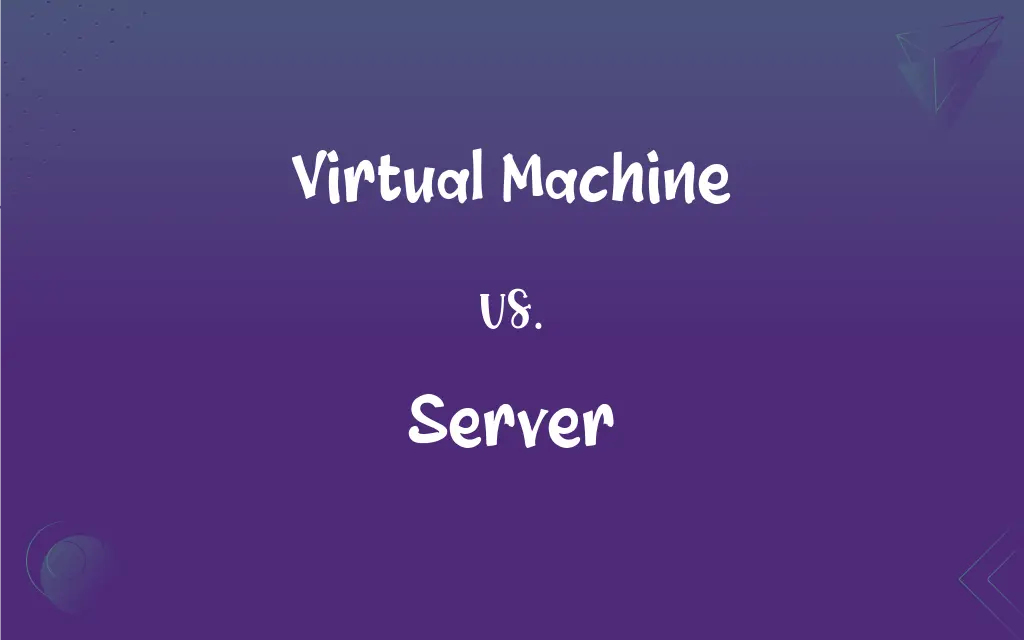Virtual Machine vs. Server: What's the Difference?
Edited by Aimie Carlson || By Janet White || Published on December 14, 2023
A virtual machine is a software emulation of a computer system, while a server is a physical or virtual system that provides services to other computers.

Key Differences
A virtual machine (VM) is a software-based emulation of a computer system, allowing multiple operating systems to run on a single physical hardware system. A server, on the other hand, is a physical or virtual system that provides resources, data, services, or programs to other computers, known as clients.
Virtual machines offer a way to partition a single physical server into multiple virtual servers, each with its own operating system and applications. In contrast, a server, whether physical or virtual, is designed to manage network resources and provide services like web hosting, data storage, or email.
The purpose of a virtual machine is to provide an isolated environment for running applications, testing, or development, replicating the functionality of a physical computer. Servers are focused on delivering continuous service and resources to client devices or other servers within a network.
Virtual machines can be quickly created, modified, or deleted, offering flexibility and efficient resource utilization. Servers, especially physical ones, require more substantial setup and maintenance, playing a critical role in the infrastructure of both local and wide area networks.
VMs are primarily software entities and rely on the underlying physical hardware of a server for their operation. Servers, whether used for hosting VMs or running applications directly, provide the essential hardware and network capabilities to facilitate various computing tasks.
ADVERTISEMENT
Comparison Chart
Nature
Software emulation of a computer system
Physical or virtual system providing services
Primary Use
Running multiple OS, testing, development
Managing network resources, delivering services
Environment
Isolated, replicates a physical computer
Delivers continuous service to clients
Flexibility
Easily created, modified, or deleted
Requires more setup and maintenance
Dependency
Relies on underlying server hardware
Provides hardware and network capabilities
ADVERTISEMENT
Virtual Machine and Server Definitions
Virtual Machine
A virtual machine provides an isolated environment for testing applications.
Developers often use virtual machines to test new software in controlled settings.
Server
A server is a computer system that provides data, resources, or services to other computers.
Our company's website is hosted on a dedicated server.
Virtual Machine
A virtual machine is a software-based emulation of a computer system.
We use a virtual machine to run legacy software incompatible with our new systems.
Server
A server can host websites, applications, or databases for client access.
The database server handles thousands of transactions every day.
Virtual Machine
Virtual machines can simulate the functionality of separate physical computers.
The virtual machine acts like a separate computer, even though it's just software.
Server
Servers are critical for network infrastructure and continuous service delivery.
The email server processes and stores all incoming and outgoing company emails.
Virtual Machine
Virtual machines allow multiple operating systems to coexist on a single physical server.
Our IT department runs several virtual machines for different development environments.
Server
Servers manage network resources and can be physical or virtual machines.
The file server stores all our important documents and makes them accessible to employees.
Virtual Machine
A virtual machine operates on virtualized hardware resources.
We allocated more memory to the virtual machine to improve its performance.
Server
Servers often require robust hardware and maintenance to manage heavy workloads.
Upgrading our server hardware improved the speed and reliability of our network services.
Server
One who serves food and drink. See Usage Note at waiter.
Server
Something, such as a tray, that is used in serving food and drink.
FAQs
What is a server?
A system that provides resources or services to other computers.
What is a virtual machine?
A software emulation of a computer system.
Can a virtual machine function independently?
No, it relies on the underlying hardware of a server.
Is it possible to run multiple VMs on one server?
Yes, multiple VMs can run on a single physical server.
Are servers only used in business environments?
No, servers are used in various environments, including personal and educational.
What's the role of a server in a network?
Servers manage and provide access to network resources and services.
How does a server connect to a network?
Servers connect through wired or wireless networking interfaces.
Can VMs have different operating systems than their host server?
Yes, VMs can run operating systems different from the host.
Do servers always need to be physical machines?
No, servers can also be virtualized.
Are virtual machines less powerful than physical servers?
VM performance can be less than physical servers due to shared resources.
What are common services provided by a server?
Web hosting, file storage, email services, and database management.
Can a server be a client to another server?
Yes, servers can act as clients to other servers.
Do VMs require special software to run?
Yes, VMs need a hypervisor or virtualization software to operate.
Can servers run without an operating system?
No, servers require an operating system to manage tasks and resources.
How do servers handle large amounts of data?
Through robust hardware, efficient software, and network management.
Is virtualization cost-effective?
Yes, virtualization can reduce hardware costs and improve efficiency.
How do VMs affect server resource utilization?
VMs can optimize resource use by allowing multiple environments on a single server.
Can any computer act as a server?
Technically, but servers are typically built with more powerful hardware to handle demand.
Are VMs suitable for gaming?
VMs can be used for gaming, but may not offer the same performance as physical systems.
Can VMs improve system security?
Yes, VMs can enhance security by isolating environments.
About Author
Written by
Janet WhiteJanet White has been an esteemed writer and blogger for Difference Wiki. Holding a Master's degree in Science and Medical Journalism from the prestigious Boston University, she has consistently demonstrated her expertise and passion for her field. When she's not immersed in her work, Janet relishes her time exercising, delving into a good book, and cherishing moments with friends and family.
Edited by
Aimie CarlsonAimie Carlson, holding a master's degree in English literature, is a fervent English language enthusiast. She lends her writing talents to Difference Wiki, a prominent website that specializes in comparisons, offering readers insightful analyses that both captivate and inform.































































